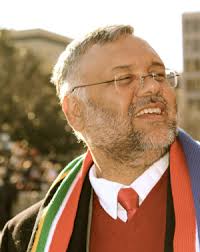The South African Ambassador to Washington
By Femi Olugbile
Diplomats are supposed to be self-effacing men and women who go around the countries of the world pursuing the interests of their countries. They live a charmed life, full of cocktail parties and swank engagements with Heads of States, Royalty, and other VIPs.
The power they embody is a nuanced one, often in the background. They make no policy but are tasked with disseminating and implementing the policies of their governments.
Ebrahim Rasool is a South African man whose origins represent the curious genetic and relational linkages that make South Africa a unique place in the world. His parentage is a melange of English, Javanese, Dutch and Indian heritage. He is the embodiment of the population that the Apartheid system labelled as ‘Coloured’, who make up 8.2% of the nation’s population, according to the last census.
He is also what many career diplomats are not – a politician with a following in his own right. On his enforced return from USA after his peremptory expulsion by his host – the government of President Donald Trump, he was received at Cape Town Airport by a large crowd of enthusiastic supporters.
He made a ‘spontaneous’ wide-ranging speech that went beyond diplomatic remit. It was addressed as much to Cyril Ramaphosa, his employer, as to Donald Trump, and the listening world. After being at the receiving end of relentless attacks at his post, he was happy to return to the dignity of being African in the land of Ubuntu, where the humanity of every man was valued, he said to the crowd. He had been called a jihadist, a terrorist, and an anti-Semite by the MAGA crowd who now ruled America. He had hoped he would have stayed long enough in Washington to debunk the rampant lie that was being peddled about. The lie claimed that the Afrikaner, who was embraced in the Rainbow Nation of South Africa despite being responsible for Sharpeville and Soweto massacres and the relentless oppression that was Apartheid, was somehow being oppressed in the new, democratic South Africa. This phantom ‘oppression’ qualified the Afrikaner to be welcomed as a refugee in USA. The lie was ‘told by a fringe group in our country, transmitted by powerful diasporans, and believed by the powerful in the USA.’ He was of course referring to Elon Musk and the other white South African expatriates who had the ear of Donald Trump.
In the still fragile world of South Africa, this bold speech was sailing close to the fire.
Concluding, he recalled that during the Liberation War, the citizens of USA compelled a reluctant White House to pass anti-Apartheid law, and that Congress was even pressurized by ordinary American citizens to veto President Reagan, who was a sympathiser of the Apartheid regime. There was pressure now for South Africa to withdraw its case from ICJ and abandon its support for oppressed peoples, such as the Palestinians. South Africa must seek America’s friendship but not allow itself to be bullied, he said.
Rasool was a long-term member of the ANC and a well-known activist in the anti-apartheid struggle. He served prison sentences and was often under house arrest during Apartheid. After black majority rule, he was Provincial Chairman of the ANC in Western Cape, and later Premier.
He was appointed Ambassador to the USA by President Jacob Zuma in 2010 and served till 2015. He was reappointed as Ambassador to the USA by Cyril Ramaphosa in January 2025.
Three months into his tenure, he was declared persona non grata by Secretary of State Marco Rubio. He had accused Donald Trump and his allies, including Elon Musk, of promoting White Supremacy in a speech to a South African think tank. USA-South African relations were at their lowest ebb in a generation.
South Africa is at cross-roads in its internal politics and external philosophy. Ramaphosa has already stretched his, and the ANC’s, street credibility to the elastic limit by entering into coalition with the white-led ‘Democratic Alternative’ party. Many black activists are accusing the government of being too slow on land reform, and too soft on the Afrikaners. Whites still control most of the agricultural land in the country, they complain. Poor blacks are still living in wretched poverty and unemployment in the townships. Crime, including murder, is rife. Little has changed, thirty years after Mandela and the end of Apartheid. Extreme right-wing Afrikaner groups, emboldened by MAGA rhetoric, are even calling on Trump to ‘do what he is doing for Israel’ by returning South Africa to white domination. It is an impossible prospect, but a provocation that is getting under some black skins.
Ramaphosa is the current Chairman of the G20, and a strong member of BRICS. The international links and internal postures of South Africa are seen by Trump as ‘hostile to America’. There are dark hints of sanctions, tariffs, personal bans and other unnamed punishments to be meted out. Trump appears convinced he can bully the African nation, like everybody else, to bend to his will. Many white South Africans are secretly, or openly. hoping he will succeed.
But will he? Perhaps he has misread the history of the black struggle in South Africa? Ramaphosa, and ANC, were forged in war. The relationship with Israel is complex. Israel was a major supporter of Apartheid and helped Apartheid South Africa to build Africa’s only nuclear bomb. But there are also many Jews who are members of the ANC.
Can Trump’s bullying succeed in beating the ‘Black Freedom’ struggle into shape, when the best efforts of his ‘Elders and Betters’ such as Ronald Reagan had failed to stop the victory of Black Power in South Africa?
Will Ramaphosa, for instance, kowtow to Trump’s demands, abandon BRICS, withdraw the ICJ case, even send an Afrikaner to replace Ambassador Rasool in Washington?
The world is about to find out what stuff the black people of South Africa, and their leaders, are made of.

